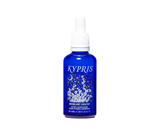Much like food, skincare products can also be organic when made of naturally derived, farmed or raised ingredients. Karen Behnke, founder of Juice Beauty, a certified organic skincare line made in California, tells us that the U.S. Department of Agriculture monitors the use of the word organic on cosmetic products just like it does with food. She explains, “Per their strict standards, organic products have absolutely no GMOs, and pesticides and fertilizers must be from an approved and regulated list. In order to sell organic products online anywhere in the United States, and claim beauty or personal care products are organic, use the word organic or feature a seal on the front of the packaging, the National Organic Program requires the product to have at least 70 percent organic content (excluding water).”
But what about all those products that say “made with organic ingredients”? Hadley King, M.D., a board-certified dermatologist, further explains that simply calling a product organic isn’t a catchall. There are actually four tiers of organic, which can be defined as follows:
- 100 percent organic: The product contains only organically produced ingredients and is permitted to display the USDA Organic seal.
- Organic: The product contains at least 95 percent organically produced ingredients and is permitted to display the USDA Organic seal.
- Made with organic ingredients: The product contains at least 70 percent organic ingredients but is not permitted to display the USDA Organic seal.
- Less than 70 percent organic ingredients: Products are not permitted to use the term organic anywhere on the packaging and cannot display the seal, but are allowed to identify organically produced items within the ingredient list, usually denoted with an asterisk.













































































